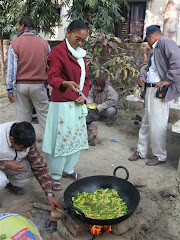Tulsi was absent most of last week preparing for his son’s wedding. He appeared on Friday, his hair and moustache dyed black to an extraordinary intensity, with piles of wedding invitations for Sunday and Monday. The event started with a band and wedding procession from the bride’s house somewhere in Sunsari, followed by days of partying at the bride’s home and later at his house.
On Monday, we learnt that the wedding had taken place as planned on Sunday, and we were all expected at Tulsi’s house as soon as the training was over for the day. A topical day on the development of community schools, as upstairs a delegation from the Ministry in Kathmandu were running a workshop on the development of community managed schools, which is likely to be a priority for the new government. Meanwhile, Gita and the rest of Lalmani’s extended family were hovering on the field dressed in their best, waiting for a rickshaw to take them to the wedding party. At 4pm the rest of us prepared to leave. We resisted attempts to get us on the back of motorbikes so we could make our own way home, so set off in a cycle procession with elderly Govinda and the peons. Half way there, David got a puncture, so we abandoned him at a cycle stall while I cycled with the others to locate Tulsi’s house, then rode back to collect David. 10 minutes and 10 rupees is enough to repair a tyre. Tulsi lives in a newly built – or partially built – bungalow north of the city. The lane outside was full of motorbikes and cycles, with many people milling about, a splendidly decorated awning over the front porch and a makeshift tent on the patch of waste ground next door. The women were splendid in red saris, dripping with gold jewellery, while most of the men were in food stained shirts, shorts and flipflops. The bride and groom were sitting on overstuffed chairs in the porch looking tired and fed up. We greeted them, and then jumped the ditch into the field where buckets of food were waiting inside the tent. The field is grazed by cows, and one had to be careful where one sat. Rice, daal, various vegetable dishes, a steaming pile of buffalo and greasy cardboard boxes full of pakora and puris were frequently replenished from cauldrons over 2 gas burners by grubby boys in frayed shorts and T shirts. Delicious; washed down with metal beakers full of water. Bones were spat onto the grass with other food debris, to the delight of the neighbourhood dogs that sneaked in to snatch morsels of food before being pelted with stones. As we were attempting to leave, a group of children attached themselves to us “auntie, uncle you must come and dance”. There was no escape and we were forced to provide the evening’s main entertainment.
Trying to perfect our water collection and usage is a challenge; it’s fine when we are at home and can wash clothes and hair at the outside tap when the supply comes on at midday. During the working week it is more difficult; we sometimes have a trickle in the morning to start to fill the buckets, and if we are lucky we can complete the task when we get home, avoiding the mosquitoes that swarm round the tap at the end of the day. The swimming pool, although increasingly green and murky, is a welcome relief. A violent storm on Thursday evening filled the flat with dust and bits of tree. David’s cleaning routine is severely compromised.
At last Bal Rani has started teaching lessons, so David is busy making name cards for all the new children. I have been training primary teachers with Bishnu, a retired secondary head, very open to new ideas and doing things differently, so we and the teachers have had a lot of fun and they have done some much improved micro-teaching.
Deb and David will try to update this blog regularly while they are in Nepal. The views that are expressed in this weblog are the writers' own and do not necessarily reflect those of VSO.
ETC Morang
Biratnagar weather
About Me
- Deb and David
- Deb and David are leaving the UK for Papua New Guinea on February 4 2011 for their 3rd VSO placement. The views that are expressed in this weblog are the writers' own and do not necessarily reflect those of VSO.
Hungry caterpillar
making statues
.jpg)
Saraswati puja
.jpg)
Christmas dahlia

Christmas

recovery

cataract operations

diagnosis

English group

English teachers

Chhath
.jpg)
Manu
.jpg)
Rosie
.jpg)
fireworks

tikka powder

making resources

Down.....

Marpha apples

Kali Ghandaki

Buddhist monks

Kagbeni monastery

Tulsi

Lalmani

grinding maize

teachers' outing

towards Darjeeling

Ilam


kindergarten visit

David and the puppets
.jpg)
David's pocket chart

next door cows

chess in Bandipur
Bandipur
Kerala temple festival
Puja, age 10

headteacher tries to break the pot
catch the biscuit
Bishnu peels vegetables
group photo
cooking

Maliti

Christmas transport
Bardia Christmas
building the straw stack
rice threshing
Tihar
Janakpur temple
Dashain swing
Poon Hill
Annapurna South
baby Krishna
chariot

decorated oxen
Krishna Janmastami
Terai floods
the cow next door
new raincoat
More plants

At home

Dinesh

science teachers

Main Road

David on the terrace

primary teachers


Headteachers' picnic

sturdy bike

Nagarkot morning

Swayambhunath temple

view from window

'home'
arrival in Kathmandu
